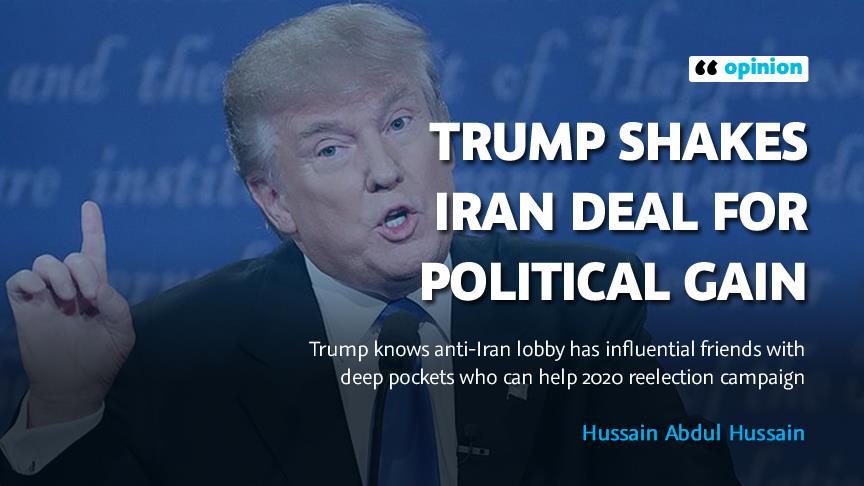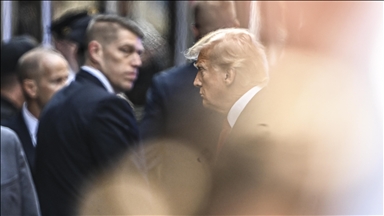Trump shakes Iran deal for political gain
Trump knows anti-Iran lobby has influential friends with deep pockets who can help 2020 reelection campaign

By Hussain Abdul-Hussain

WASHINGTON
America and the world have been so focused on President Donald Trump’s decertification of the nuclear deal with Iran that everyone missed the main message behind his step.
For decades, Washington tried to separate Iran’s nuclear program from what America calls Tehran’s "destabilizing activities in the region,” reasoning that coming to political terms with Iran might be
Unlike former U.S. presidents who tried -- and succeeded in the case of Barack Obama -- in separating nuclear from non-nuclear, Trump reversed past policies by mixing Iran’s nuclear and non-nuclear issues.
Trump’s decertification before Congress is technical and has little effect on the nuclear agreement with Iran, known as the Joint Comprehensive Plan of Action (
Security Council resolutions are binding for all member states. These resolutions are not international treaties that require ratification by national legislative bodies. Democratic President Obama, however, sought to legitimize the Iran deal by acquiring congressional approval.
A reluctant Congress, controlled by the Republican Party, played along, with a caveat: The White House would have to “certify” before Congress every three months that Iran was compliant. Otherwise, Congress would revoke its vote and reinstate the “nuclear sanctions” on Iran which were suspended under JCPOA.
Calculating that once JCPOA went into effect and Iran was economically reintegrated into the world order, Tehran would start importing U.S. manufacture, thus creating a powerful lobby of U.S. interests that would rush to defend the deal in Congress, facing any possible attacks.
Obama, who was almost certain that fellow Democrat Hillary Clinton would succeed him in the White House, believed that Clinton would protect the deal, even if Congress voted to annul it and reimposed sanctions. By law, the U.S. president is king when it comes to foreign policy.
Last month, the two houses of Congress passed, with an overwhelming bipartisan majority, sanctions on Russia for its intervention in the 2016 presidential U.S. election. Trump, who thinks that punishing Russia for such an intervention blemishes his electoral victory, ignored the new law, despite signing it since it came to his desk with a veto-proof majority.
As a matter of principle, after Congress legislates sanctions on foreign nations, it remains at the discretion of the president to choose which sanctions to enact, or none at all.
Trump could have reimposed all the “nuclear sanctions” on Iran, without even consulting Congress. Trump could have lifted the remaining U.S. “non-nuclear sanctions” on Iran, also without prior approval from Congress. If Trump has such authority, then why make a big fuss of decertification, without actually reinstating the “nuclear sanctions” on Iran?
The only answer that can explain the noise Trump made with his “decertification” was that he saw in it such good political theatre. Trump is a reality TV
He also knows that the anti-Iran lobby has some influential friends, with deep pockets, who can help Trump’s reelection campaign in 2020.
Next steps
What happens next? The battle over JCPOA cannot be fought in Congress, but at the IAEA in Vienna, and the Security Council in New York. When the Obama administration negotiated the agreement with the Iranians, it based the deal on trust and good faith. Hence, Washington and Tehran chose ambiguous language that -- in the absence of trust between the two capitals, like in the case
Two points especially stick out from the point of view of the Trump administration. The first hindered the deal for
Iran considered this an act of aggression on its
Detractors of such compromise argue that Iran could run non-radioactive nuclear weapons’ tests -- such as nuclear detonators -- in some of its facilities without being radioactively detected, while prior approval would give Tehran enough time to move around any illicit nuclear designs or experiments.
Detractors of JCPOA, who found a strong ally in Trump, now demand “unfettered access” for international inspectors into any suspected Iranian facilities, thus scrapping the prior notice arrangement.
Such demands will require some amendments around the treaty’s
The way the American demand plays out would determine the future of JCPOA and might result in restoration of crippling international sanctions on Tehran.
Iran, meanwhile, would find itself in a bind. Should it concede to the American demand of amending JCPOA and allowing international inspectors unfettered access, Tehran might be seen as a pushover. Should the Iranians stand their ground, however, America would make the deal crumble.
While many incorrectly believe that America could restore sanctions unilaterally, even that would not be enough to hurt Iran. Washington could, in fact, force the deal to collapse, thereby automatically restoring all previous UN sanctions on Iran.
For all the trust and concessions that America offered, by passing on “unfettered access” and lifting restrictions on Iranian experiments with ballistic missiles, the Obama administration made sure to design JCPOA with a strong “snap-back” option. In other words, anytime one of the seven parties, signatories to the original framework -- that is the Security Council’s permanent members, Germany and Iran -- objects to any part of the agreement or its implementation, a dispute resolution mechanism takes effect.
When consensus over JCPOA is absent, the dispute goes to a group of experts. If these fail to reach an agreement, the issue goes to the seven foreign ministers. When these fail, the Security Council meets to “renew” JCPOA. If the council fails in renewal, the pre-deal international sanctions on Iran automatically go back into effect.
For America, this means creating a dispute, which the Trump administration has just started. If the dispute continues without resolution and reaches the Security Council, all America has to do is vote against “renewal” of JCPOA, and the crippling international sanctions will hit Iran again. From there on, countries that keep doing business with Iran will be in violation of Security Council resolutions, a matter that businesses around the world do not take lightly.
The fact that Trump reconnected what Washington perceives as non-nuclear Iranian destabilization with Tehran’s nuclear issue suggests that America intends to go all the way to disrupt JCPOA and let the sanctions relapse.
The only way out for Iran is the amendment of the deal to give inspectors “unfettered access” and restore the clause that bans Iranian “ballistic missiles.” Either way -- whether JCPOA collapses and sanctions on Iran are restored, or whether Iran concedes and all its sites become open to inspectors while Iran stops its ballistic missiles program -- will be a domestic political triumph for Trump. It looks that the U.S. president is making sure to hype up what he sees as a certain foreign policy victory for him.
*Opinions expressed in this article are the author’s own and do not necessarily reflect the editorial policy of Anadolu Agency.
Anadolu Agency website contains only a portion of the news stories offered to subscribers in the AA News Broadcasting System (HAS), and in summarized form. Please contact us for subscription options.


